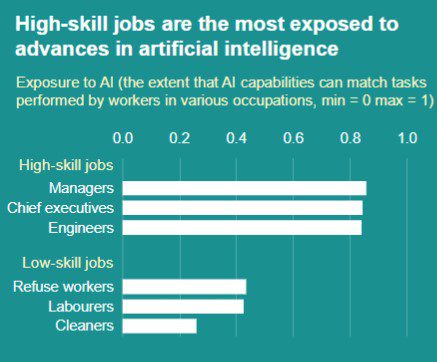OECD: AI is a greater threat to job quality, than quantity
At least in the short term, according to the inter-governmental organization’s latest research.
News In Brief
Individuals may be worried about losing their jobs to AI.
But they should be perhaps focus more on the quality and intensity of their work, according to the latest data from the OECD.
Here are the top takeaways from the OECD report.
Over the past six months, ever since OpenAI’s generative AI chatbot ChatGPT emerged on the scene, there has been significant discussion and fear about whether artificial intelligence (AI) will steal our jobs and put millions of people out of work.
However, new research from the Organization for Economic Co-operation and Development (OECD) found that there is “little evidence so far of a significant effect of AI on the number of jobs” – in the words of the OECD’s Secretary-General Mathias Cormann who spoke at a press conference about the new report.
Instead, as things stand currently, AI is having a greater impact on job quality.
The OECD believes that for most workers, AI will have its most visible impact not from lost employment but from its impact on the intensity and quality of jobs.
While AI is great for automating tedious, repetitive tasks – and this has real benefits for workers’ performance, engagement and wellbeing – AI is far from a silver bullet.
AI is also making work more intense and creating higher pace, higher stress environments.
According to the OECD’s survey of 2,000 companies and 3,500 workers in the manufacturing and finance sectors, AI was five times more likely to increase the pace of work, rather than decrease.
75% of finance workers, and 77% of manufacturing employees, said that AI had increased the pace at which they performing tasks.
Part of the reason for this growth in work intensity as a result of the role AI plays in worker management and monitoring, plus it may reduce human contact in the workplace, which could be detrimental for employee experience.
Involve workers when introducing AI at work
As the OECD makes clear, these findings on job quality versus job quantity are just for now.
In its global survey of finance and manufacturing workers, the OECD found three in five are worried about AI causing job losses over the next decade.
The OECD further noted that 27% of jobs were at high risk of automation in the next decade – interestingly, although high skilled workers are most optimistic about the positive impact of AI at work, they are most likely to be impacted by job losses from AI.

Credit: OECD’s Employment Outlook 2023.
While it is clear that upskilling is necessary for employees to adapt to evolving AI technologies – and therefore stay employable in the AI-powered future – the OECD also called on employers to involve workers in AI conversations.
This is because the report found that when organizations consult workers on the adoption of AI at work, that is beneficial for productivity and performance, as well as wellbeing at work.
This was something that futurist and Mercer partner Ravin Jesuthasan emphasized in a recent exclusive interview with UNLEASH.
He shares: “You’ve got to get them to understand generative AI”, but companies also have to show them why they should buy into and leverage this technology at work.
A lot of people will think, “Hang on, I am going to redesign my work, and then put myself out of a job”. It is necessary to reassure them that it won’t actually take their job – instead it could make their jobs more engaging and meaningful.
Sign up to the UNLEASH Newsletter
Get the Editor’s picks of the week delivered straight to your inbox!

Chief Reporter, UNLEASH
Allie is an award-winning business journalist and can be reached at alexandra@unleash.ai.